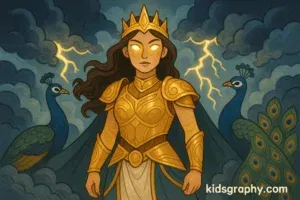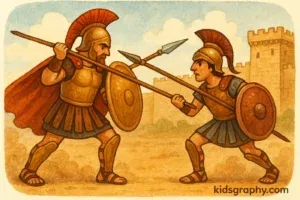In the beginning, before the gods of Olympus ruled the skies, before the sun and moon took their places in the heavens, there was Nyx—the goddess of the night.
Mysterious, powerful, and older than the Olympians themselves, Nyx in Greek mythology is one of the most ancient and feared deities. Even Zeus, the king of the gods, respected her power.
While she might not be as well-known as Athena or Hera, Nyx played a central role in shaping the cosmos and giving birth to some of the most intense forces in Greek myth.
Who Is Nyx in Greek Mythology?
Nyx (pronounced “Niks”) is the Greek goddess who personifies the night. She wasn’t just a goddess who ruled over darkness—she was the darkness. Born from Chaos, the great void from which everything began, Nyx existed before day and light were even created.
She is often described as a beautiful woman with dark wings, moving silently across the sky. She brings night with her, spreading shadows and stars wherever she goes.
Even though she rarely appears in myths, her presence is felt across many stories. Ancient Greeks believed she rode across the sky in a black chariot, pulling the night behind her as her daughter Hemera (Day) followed at dawn.
A Goddess Even Zeus Feared
Goddess Nyx in Greek mythology was so powerful that even Zeus, the ruler of Olympus, avoided conflict with her.
In one myth, when Hypnos (the god of sleep and Nyx’s son) angered Zeus, he fled to his mother for protection. Zeus, despite being furious, did not pursue Hypnos while he was near Nyx. He knew her power was too great to challenge.
This shows just how ancient and respected Nyx was. While other gods might fight or trick each other, Nyx remained untouchable—silent and sovereign in the darkness.

Nyx’s Children: Gods of the Deepest Forces
One of the most fascinating parts of Nyx greek mythology is her children. Depending on the myth, she gave birth to them alone, without a partner, or with Erebus (darkness).
Her children weren’t just ordinary gods—they were the forces that even other gods feared:
- Hypnos – god of sleep
- Thanatos – god of death
- Eris – goddess of strife and discord
- Momos – god of blame and criticism
- Nemesis – goddess of revenge
- Moros – spirit of doom
- Oizys – goddess of pain
- Gerus – spirit of old age
- The Fates (Moirai) – who controlled destiny

These children were not rulers of places, like Poseidon or Hades—they were rulers of emotions, destinies, and endings. They represent what lies beyond human control: sleep, death, chaos, fate, and punishment.
That’s why Nyx is often seen as a primordial force, not just a goddess. She didn’t live on Mount Olympus. She belonged to a deeper, older world—the shadowy edges of the universe.
Nyx in Art and Culture
In ancient pottery and paintings, Nyx is often shown as a winged goddess dressed in flowing black robes, sometimes crowned with stars. She moves quietly, often in contrast to her daughter Hemera, the goddess of day.
In modern books and stories, Nyx is often reimagined as a mystical, gothic figure, full of wisdom and darkness. She appears in poetry, fantasy novels, and even video games. In all these stories, one thing stays the same—Nyx is powerful, quiet, and timeless.
Her name has also inspired science, art, and even astronomy. For example, one of Pluto’s moons is named Nix (a spelling variation of Nyx), honoring her cosmic roots.

Nyx in Today’s Mythology Books
Many modern readers know about Nyx from Greek mythology through fantasy series and retellings. In Rick Riordan’s Percy Jackson universe, Nyx appears in The House of Hades. She is shown as commanding, cold, and still feared by all.
In fiction and fan stories, she’s often portrayed as:
- A mother mourning her children’s fates
- A neutral force who guards the balance between life and death
- A secret protector of lost souls and forgotten gods

These retellings help bring her into modern culture, showing that even the oldest deities still shine in our imagination.
Nyx and Her Eternal Role
Unlike gods who ruled Olympus or Earth, Nyx ruled something more mysterious—the unseen. Nyx was not good or evil. She simply existed, bringing night with her.
Nyx teaches us that not all power is loud. Sometimes, the greatest force is the quiet one—the one that moves in shadows, watches from a distance, and controls the parts of life no one else can touch.
Nyx reminds us that night is not just the absence of day. It’s a realm of its own—deep, vast, and full of mysteries.
More Stories: Greek mythology
Nyx is the ancient Greek goddess of the night, born from Chaos. She is one of the first beings in Greek myth and represents the power of darkness.
Yes, even Zeus feared Nyx. In myth, he avoided fighting her when her son Hypnos sought her protection, showing her immense power.
Nyx gave birth to many powerful deities, including Hypnos (sleep), Thanatos (death), Nemesis (revenge), Eris (discord), and the Fates.
Nyx symbolizes the night, mystery, fate, and all unseen forces. She represents the natural power that exists outside the control of even the gods.
Read More: Calypso Greek Mythology: The Lonely Nymph









